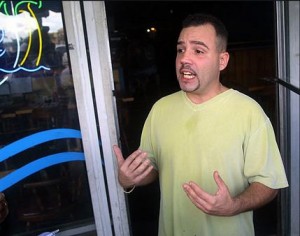 The elaborate cover-up of the activities in Florida of Mohamed Atta and the other terrorist hijackers, first reported here and in “Welcome to TerrorLand,” (read the 1st chapter.pdf) received spectacular confirmation last week from a surprising source, The Miami Herald.
The elaborate cover-up of the activities in Florida of Mohamed Atta and the other terrorist hijackers, first reported here and in “Welcome to TerrorLand,” (read the 1st chapter.pdf) received spectacular confirmation last week from a surprising source, The Miami Herald.
In an Osama Bin Laden postmortem headlined “Mastermind may be gone but troubled memories linger,” reporter Elinor Brecher checked in on people in Florida whose lives forever changed after intersecting with the terrorist hijackers.
And the process clearly exposed the mechanism of “instant revisionist history” used during the aftermath of the 9/11 attack to cover-up reporting in the mainstream media which contradicted or was otherwise at odds with the official story then being assembled.
The paper tracked down the former manager of Shuckum’s Raw Oyster Bar, Tony Amos, whose misfortune was to have witnessed Mohamed Atta, Marwan Al-Shehhi and a third still-unidentified man getting drunk in his bar several nights prior to the 9/11 attack.
In the article’s opening sentence, The Mami Herald confirmed what to some observers was never in doubt: Tony Amos tells the same story today that he first related in TIME, NEWSWEEK, and the AP wire service just two days after the 9/11 attack:
“On Sept. 7, 2001, Mohamed Atta and Marwan al-Shehhi pounded down drinks at Shuckum’s Oyster Bar on Young Circle in Hollywood,” the paper reported…”forever changing life for some in South Florida who unknowingly entered their orbit. Like Tony Amos, the night manager who backed up waitress Patricia Idrissi at Shuckum’s.”
Mohamed Atta got—not just drunk—but drunk and belligerent.
For the past almost ten years the official story has insisted exactly the opposite.
The incident at Shuckum's
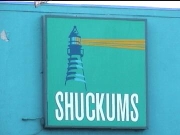 Kudos to reporter Brecher, who performed an increasingly-rare feat. She committed journalism.
Kudos to reporter Brecher, who performed an increasingly-rare feat. She committed journalism.
The term ‘revisionist history’ first came to prominence to describe Holocaust deniers like David Irving, who claimed 6 million Jews didn’t die in Nazi extermination camps, as if it were somehow less horrific if the number dropped to “only” 4 or 5 million.
The methods of revisionism, on the other hand, include applying new knowledge to the slow and careful reexamination of historical facts, and are the essence of scientific inquiry, and produce, hopefully, a more accurate historical understanding. (cf: The Dark Ages, no longer as dark as previously thought.)
However, 'instant revisionist history,' or the excising of inconvenient knowledge in real time, appears to be a relatively new phenomena. And the 'incident at Shuckum's' may be the first time the machinery, used to eliminate independent reports from numerous reporters citing multiple sources, has been rendered visible.
We can now watch as the initial stories, which turn out to have the virtue of being true, are replaced without explanation by a version of events deemed more satisfactory by the purveyers of what soon becomes "the official story," thereafter repeated without deviation, like Holy Writ, throughout the various 9/11 investigations.
In this second story, or fable, really, Mohamed Atta does not drink, never swears, and was notwearing an American Airlines pilot's uniform, as persistent rumors have it, when he boarded an American Airlines flight in Boston on the morning of Septenber the 11th.
We can then compare the treatment of the incident at Shuckum's to a similiar episode of inconvenient knowledge, in which Amanda Keller's story was also quickly "disappeared."
How to go from 'F-ck God' to drinking cranbery juice… in a hurry
 It all began in Shuckum’s, which was, as we reported after a visit, “a dive bar with a tired-looking nautical theme, complete with a life-sized shark mounted on the wall.”
It all began in Shuckum’s, which was, as we reported after a visit, “a dive bar with a tired-looking nautical theme, complete with a life-sized shark mounted on the wall.”
On the day after the attack, September 12th, the Associated Press, in an interview with bar manager Tony Amos, reported:
"The guy Mohamed was drunk, his voice was slurred, and he had a thick accent," Amos said.
"Bartender Patricia Idrissi said the men argued over the bill, and when she asked if there was a problem, 'Mohamed said he worked for American Airlines, and could pay the bill.'"
The next day, Newsweek reported that “Atta and two of his buddies seem to have gone out for a farewell bender at a seafood bar called Shuckum’s."
"Atta drank five Stoli-and-fruit-juices, while one of the others drank rum and Coke. For once, Atta and his friends became agitated, shouting curse words in Arabic, reportedly including a particularly blasphemous one that roughly translates as “F—k God.”
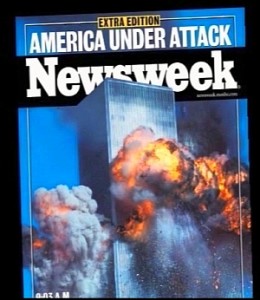 Then TIME magazine weighed in:
Then TIME magazine weighed in:
“It was at Shuckum’s, on Sept. 8, that Mohamed Atta and Marwan Al-Shehhi did some pre-mass murder tippling. Atta drank vodka and orange juice, while Al-Shehhi preferred rum and cokes, five drinks apiece.”
That same day the ST. PETERSBURG TIMES (certainly not our favorite newspaper) added another wrinkle. After retailing again the business with the bill, bartender Idriss said, "They were wasted."
She directed them to a Chinese restaurant down the street for some food, Idrissi said, after which they returned, and each ordered another five drinks.
"What to do when published reports all agree"
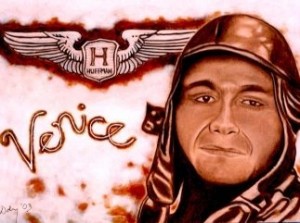 All three major American networks also reported the same basic story: FBI Agents showed up at Shuckum’s just 12 hours after the attack. The agents showed employees—especially manager Tony Amos and bartender Patricia Idrissi—photos of two men.
All three major American networks also reported the same basic story: FBI Agents showed up at Shuckum’s just 12 hours after the attack. The agents showed employees—especially manager Tony Amos and bartender Patricia Idrissi—photos of two men.
“We were able to recognize both gentlemen,” Amos told reporters. “He identified a man in a photo bearing the name Mohamed underneath, who, along with two other men, had each consumed at least several drinks.”
Idrissi said FBI agents told her the men “were on the plane and passed away.”
The two and another man ‘got wasted’ in his place, Amos said, downing “Stolichnaya and orange juice and Captain Morgan’s spiced rum and Coke.”
“Atta drank Stoli vodka for three straight hours,” confirmed bartender Patricia Idrissi. “The guy, Mohamed, was drunk. They were wasted.”
Idrissi said the men told her they wanted to eat but didn’t like what was on the menu, so she sent them to a Chinese restaurant a few doors down. They were very rude, she said.
“They didn’t want to pay the bill. When asked if they could afford the $48 bar tab, Atta’s face had darkened. He pulled out a thick roll. ‘You think I can’t pay? I’m a pilot for American Airlines. I can pay my fucking bill.’”
Their behavior, in short, was in sharp contrast with the characterization of the hijackers as a "small band of religious zealots."
What does it say about Mohamed Atta that he was someone who knew the importance of a brand of vodka with an authentic Russian heritage when you're, you know… 'ready to let the night unfold?'
"A Fanatic's Quiet Path to Terror"
What makes this incident truly important is not that terrorist hijackers just nights away from a rendezvous with hell went out and got drunk, but the visibility of the cover-up, the “instant revisionist history,” which took place afterwards.
First reported here, and later extensively covered in “Welcome to TerrorLand,” the incident clearly reveals the outlines of the cover-up-in-process which was then taking place all over Florida.
Leading the cover-up was the The Washington Post. Under a September 22 2oo1 headline reading “A Fanatic's Quiet Path to Terror,” the paper reported:
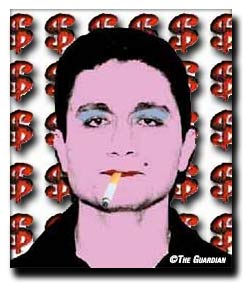 “The Friday night before the attacks, Atta and two other men — one of them another suspected hijacker, Marwan Al-Shehhi — spent 3 1/2 hours at a sports bar in Hollywood, Fla., called Shuckum’s. Atta played video games, a pursuit out of line with fundamentalist beliefs. But the manager on duty that night has said that he doesn't recall seeing Atta drink alcohol.”
“The Friday night before the attacks, Atta and two other men — one of them another suspected hijacker, Marwan Al-Shehhi — spent 3 1/2 hours at a sports bar in Hollywood, Fla., called Shuckum’s. Atta played video games, a pursuit out of line with fundamentalist beliefs. But the manager on duty that night has said that he doesn't recall seeing Atta drink alcohol.”
An earlier Sept 16 2001 story in same newspaper was at pains to deny that Mohamed Atta had claimed to be a pilot for American Airlines. The paper now quoted manager Amos as having said that it was Marwan Al-Shehhi who grew upset.
“The manager, Tony Amos, recalled yesterday that he inquired whether they could not afford the bill. Shehhi ‘looked at me with an arrogant look," Amos said. ‘He pulled out a wad of cash and put it on the bar table and said, 'There is no money issue. I am an airline pilot.'"
On Sept 27 the St Petersburg Times fell in line. Two weeks after reporting Atta was wasted, the paper without explanation shifted its position to:
"Witnesses said Atta played video games while Al-Shehhi and another man sipped vodka and orange juice."
L.A. Times reporter hands-down "best liar in town."
Also squelching reports of Atta's heavy drinking, and with new details, was a story on the terrorist’s final days by reporter Terry McDermott in the September 27, 2001 Los Angeles Times:
“That same night (Sept 7) down the coast in Florida, Atta and Al- Shehhi went to Shuckum’s sports bar in Hollywood along with a still unidentified third man.”
“The owner, Tony Amos, says Atta sat quietly by himself and drank cranberry juice and played a video game, while Al-Shehhi and the other customer tossed back mixed, drinks and argued.”
Why had the restaurant manager changed his story? A lapse of memory? A case of mistaken identity? McDermott doesn't say. In any Home Run Derby to see who can hit the most foul balls, McDermott would shine.
Even so, it's not McDermott's newspaper reporting, but his book "Perfect Soldiers: The Hijackers, Who They Were, Why They Did It," that ultimately takes first place in the “instant revisionist history” sweepstakes.
According to his book, Mohamed Atta didn’t drink, do cocaine, or hang out in strip clubs.
Mini-review: "Perfect Soldiers is perfect dreck."
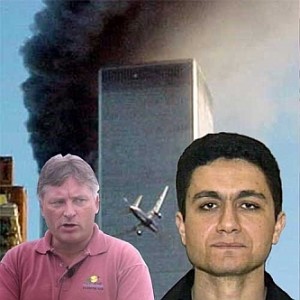 The book contains no mention at all, of course, of the huge heroin bust (biggest in Central Florida history) on the Lear jet of Wally Hilliard, owner of the Huffman Aviation flight school attended by both Mohamed Atta and Marwan Shehhi.
The book contains no mention at all, of course, of the huge heroin bust (biggest in Central Florida history) on the Lear jet of Wally Hilliard, owner of the Huffman Aviation flight school attended by both Mohamed Atta and Marwan Shehhi.
The omission seems puzzling. It certainly seem germane to an understanding of who the hijackers really were, and what they were really doing in this country while awaiting word to commit the still-young 21st Century’s greatest atrocity.
These were, after all, two men who piloted airplanes which brought down the World Trade Center Towers to such devastating effect.
Another curious oversight: McDermott never mentions either secretive flight school financier Wally Hilliard or his sidekick, international criminal Rudi Dekkers.
The book's assertion that Mohamed Atta was a teetotaler is its toughest sell. McDermott's entire explanation is this one oddly-argumentative paragraph denying everything.
“There were all sorts of retrospective sightings of the group or individuals within it. Atta, in particular, with his distinctive and later well-publicized face was seen everywhere. Or, at least that is what people remembered afterwards. He was said to have inquired about buying a crop-duster plane, to have been treated for anthrax poisoning, to have flown reconnaissance missions over nuclear power plants, to have turned into a two-fisted drinker in coastal taverns. Most notoriously, Atta was said to have flown under an alias to Prague, in the Czech Republic, in mid-April and to have met there with an Iraqi spymaster plotting to blow up a broadcast tower of Radio Free America. Little of this seems likely; some of it is demonstrably untrue; and none of it has been proved otherwise.”
Not exactly "the real slim shady"
The lack of specificity in this explanation, considering the subject is the murder of almost 3000 people, seems not just shocking, but breathtakingly cavalier.
But who am I to judge? Mainstream media reports seeking to refute investigative reporting published here almost never even deign to mention my name. The Miami Herald story, for example, also interviewed Rudi Dekkers (which we will cover in a story tomorrow) attributes accounts of his knavery to “conspiracy-minded websites."
"Dekkers, 54, who has been the object of much speculation on conspiracy-minded websites."
Each and every account of Dekkers' criminal history originated in this space, written by your present correspondent.
For the record, my name is Daniel Hopsicker.
Since I can’t even get my name in the newspaper, it appears to be beyond my station to point out the myriad logical inconsistencies in the above paragraph by reporter McDermott, who worked, after all, for the prestigious Los Angeles Times. But I can't help wondering:
If Atta didn’t go to Prague, does that mean he didn’t rent crop dusters, either?
Home Run Derby King hits another one out of the park
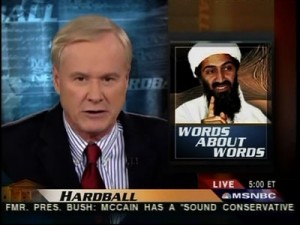 In an interview on Hardball with Chris Matthews McDermott dismissed reports of the hijackers high-living ways. But Matthews seemed to know otherwise.
In an interview on Hardball with Chris Matthews McDermott dismissed reports of the hijackers high-living ways. But Matthews seemed to know otherwise.
“It seems like they (the hijackers) came to America and hung out in sort of the underworld. They hung out at the fast- food places, the strip bars… the sleazy side of American life…”
“I don’t think it’s true to say that most of these guys did that,” McDermott retorted. “I mean, Atta, for instance, never went in a strip club in his life. This guy was so repressed that I don’t think he ever had an impure thought.”
Perhaps this explains Publishers Weekly’s review of his book, which begins:
“It's taken three-plus years for a serious study of the hijackers, but the wait was worth it. Engrossing and deeply disturbing from the start, L.A. Times reporter McDermott has dug deep, interviewing scores of friends, relatives and officials worldwide and trawling through troves of documents.”
Tony Amos left the job just a few weeks after 9-11, the Herald reported. "By then, he’d been interviewed by the FBI several times on the phone or at a little deli about three shops down."
Today he owns El Sloppy Taco in Brunswick, Md. His brush with 9-11 infamy played into his decision “just to get away,’’the paper reported. Said Amos, “When they told me they were on the flight manifests, it was like someone punched me in the stomach.’’
This correlates closely with what we were told when we stopped at Shuckum’s a year after the 9/11 attack, and learned neither he nor bartender Idrissi were there any longer. "No one knew where they’d gone," the current bartender told us, indicating in an off-the-record sort of way that their leave-taking had been 9/11 related.
"Out of Town: Most popular destination after FBI interview:"
Tony Amos wasn't the only eye-witness to leave town after being interviewed several times by the FBI.
In the light of what recent revelations about instant historical revisionism mean to the story of the 9/11 hijackers in Florida, tomorrow we'll ask:
What do they mean to the story of Amanda Keller?
Amamda Keller's only statement to reporters were these eleven words:
"I can't really say anything. I'm afraid I'll get in trouble."
Then she fled Venice, seeking to evade one specific reporter from the Sarasota Herald-Tribune, a man who was himself shortly thereafter fired when he was caught spying on other reporters and snooping through the paper's databases.
When, five years later, this same girl (reportedly) told another reporter for the Sarasota Herald-Trivune (or did she?) that she'd lied about living with Mohamed Atta, the only reason the paper reported she gave them was "My bad."
Since we've learned that Tony Amos was mis-quoted, or maybe had words put in his mouth he never even spoke, we've been wondering:
What could "my bad" possibly mean?
STAY TUNED.
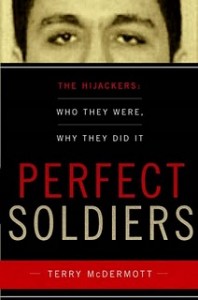
One response to “9/11 REVISIONIST HISTORY EXPOSED”
[…] ← 9/11 REVISIONIST HISTORY EXPOSED DEA still ‘in denial’ on American DrugLords → […]